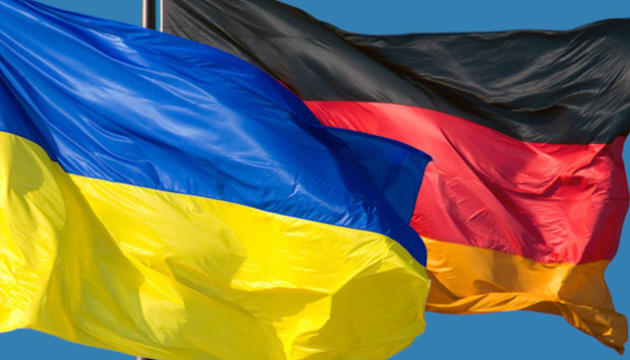Doing business

The German government condemns Russia’s ongoing attack on the territory of Ukraine and emphasizes the need to continue to provide financial, military and humanitarian assistance. The Federal Republic will continue to support an independent Ukraine that is defending itself against Russian aggression and will also provide assistance in the civilian sphere, such as demining, energy infrastructure and reconstruction.
For the first time in its history, Germany is playing the role of a guarantor state. On February 16, German Chancellor Olaf Scholz and President of Ukraine Volodymyr Zelenskyy sign a bilateral agreement on security cooperation between Ukraine and Germany. By signing the agreement, Germany reaffirms its unwavering support for Ukraine’s independence, sovereignty and territorial integrity within its internationally recognized borders of 1991. The document is valid for ten years from the date of its signing and clearly sets out the specific components of the security commitments that Germany has made to Ukraine.
In total, Germany has allocated or committed €28 billion in military aid, including PzH 2000 self-propelled howitzers, Marder infantry fighting vehicles, Gepard anti-aircraft guns, air defense systems, MLRS, and Leopard tanks. Currently, Germany ranks second in terms of aid to Ukraine, while the United States ranks first.
The main priority of German assistance to Ukraine remains air defense systems. Berlin leads a coalition of partner countries that are working to strengthen Ukraine’s air defense. In particular, Germany intends to provide Ukraine with additional IRIS-T anti-aircraft systems and Gepard anti-aircraft self-propelled guns this year.
The German government has approved €7.1 billion in military aid to Ukraine in 2024, of which a €1.1 billion package is already being prepared. The package includes 18 Panzerhaubitzen-2000 self-propelled howitzers, 18 RCH 155 wheeled howitzers, 120,000 rounds of 122 mm artillery ammunition, a second SkyNex anti-aircraft missile system, and 100 more IRIS-T SLS missiles.
In addition, the Ukrainian Armed Forces will receive 80 Leopard 1 tanks, artillery and artillery ammunition, armored personnel carriers, armored personnel carriers, engineer tanks, 450 vehicles, mine clearance systems, drones, radars and reconnaissance systems.
Ukraine will also receive six Sea King Mk41 multi-purpose helicopters along with a set of spare parts. The German side will also provide training for the Ukrainian military. The Sea King is a proven and reliable helicopter that will help Ukrainians in many areas, from reconnaissance over the Black Sea to the transportation of soldiers. This is the first German delivery of this type.
Germany will also provide Ukraine with €100 million in short-term military aid, including military equipment, bombs for small drones; 77 MULTI 1A1 trucks, medical equipment; spare parts for various weapons systems and equipment repair, etc.
The German authorities are actively purchasing shells for Ukraine. On December 15, the government approved a framework agreement with a French company to produce an additional batch of ammunition. Prior to that, Germany ordered a batch of 120 mm artillery mines for Ukraine from Rheinmetall. Germany will also provide 180,000 artillery shells as part of a Czech initiative to purchase 800,000 rounds of ammunition for Ukraine. The delivery of the shells is scheduled to begin this summer. In total, Germany plans to supply Ukraine with more than 350,000 artillery shells in 2024.
The federal government also plans to train 10,000 Ukrainian soldiers in 2024.
The German government donated 370 generators to communities in Dnipropetrovsk region. The generators were installed in the resilience centers, hospitals and social institutions.
Supporting and stimulating the development of Ukrainian entrepreneurship is a priority for the German Government. Under the EU4Business program, funded by the European Union and the German government, micro, small and medium-sized enterprises (MSMEs) in Ukraine with export potential and innovative capabilities can receive 100 grants of up to €10,000 each to help them recover, develop and build resilience in times of war.
On behalf of the German government, Deutsche Gesellschaft für Internationale Zusammenarbeit (GIZ) GmbH is providing support to keep the Ukrainian economy functioning even in times of war: about 1,800 small and medium-sized enterprises receive financial support from GIZ. GIZ also provides advisory support for entering new markets and attracting new customers, as well as looking for safe locations for relocating businesses from destroyed settlements or occupied territories. This allows businesses to continue their operations and provide jobs for people – even after the war ends. In addition, GIZ supports vocational education so that young people can find their place in the labor market.
The German government has allocated €5.6 million to support Ukrainian small and medium-sized processing enterprises under the grant project “Access to Finance and Sustainability of MSMEs in Ukraine”.
The current level of economic relations between the Dnipropetrovsk region and Germany may indicate a significant potential for growth in the field of investment. There are 45 German companies operating in the region, which have invested $789.3 million in the region’s economy, accounting for 12.9% of total foreign investment.
Germany remains an important trading partner of Dnipropetrovsk region. The high level of partnerships is evidenced by the bilateral analysis of foreign trade. German companies are most interested in ferrous metals and products made of them, fruits and seeds of oilseeds, parts of railway equipment, etc. According to the results of 2023, the volume of exports of goods from Dnipropetrovsk region amounted to $216.6 million and increased by 20.3% compared to 2022. Exports to Germany accounted for 4.6% of the region’s total exports.
197 companies in Dnipropetrovsk region exported their products to the German market, including metallurgical enterprises, machine-building, processing and agricultural companies.
Imports of goods from Germany to Dnipropetrovsk region increased by 14.9% compared to 2022 and amounted to $296.2 million.
693 importing companies in the region purchased pharmaceuticals, machinery and equipment, land transportation vehicles, plastics and polymeric materials, etc.
Import operations were mainly carried out by food and processing companies, trade and pharmaceutical companies.
Information for this article was taken from open online sources